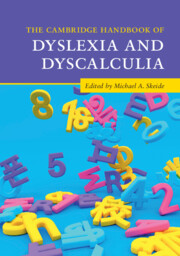Book contents
- The Cambridge Handbook of Dyslexia and Dyscalculia
- The Cambridge Handbook of Dyslexia and Dyscalculia
- Copyright page
- Contents
- Figures and Tables
- Contributors
- Acknowledgements
- General Introduction
- Part I Theoretical Frameworks and Computational Models
- Part II Cognitive Profiles and Behavioural Manifestations
- Part III Genetic and Environmental Influences
- Part IV Neurodevelopmental Foundations
- Part V Gender, Ethnicity, and Socioeconomic Background
- Part VI Cultural Unity and Diversity
- Part VII Early Prediction
- Part VIII Intervention and Compensation
- 19 Randomized Controlled Trials in Dyslexia and Dyscalculia
- 20 Cognitive Enhancement and Brain Stimulation in Dyslexia and Dyscalculia
- 21 Persistence and Fade-Out of Responses to Reading and Mathematical Interventions
- Summary: Intervention and Compensation
- Part IX Best Practice – Diagnostics and Prevention
- Part X Best Practice – Schooling and Educational Policy
- General Summary
- References
- Index
- References
19 - Randomized Controlled Trials in Dyslexia and Dyscalculia
from Part VIII - Intervention and Compensation
Published online by Cambridge University Press: 28 July 2022
- The Cambridge Handbook of Dyslexia and Dyscalculia
- The Cambridge Handbook of Dyslexia and Dyscalculia
- Copyright page
- Contents
- Figures and Tables
- Contributors
- Acknowledgements
- General Introduction
- Part I Theoretical Frameworks and Computational Models
- Part II Cognitive Profiles and Behavioural Manifestations
- Part III Genetic and Environmental Influences
- Part IV Neurodevelopmental Foundations
- Part V Gender, Ethnicity, and Socioeconomic Background
- Part VI Cultural Unity and Diversity
- Part VII Early Prediction
- Part VIII Intervention and Compensation
- 19 Randomized Controlled Trials in Dyslexia and Dyscalculia
- 20 Cognitive Enhancement and Brain Stimulation in Dyslexia and Dyscalculia
- 21 Persistence and Fade-Out of Responses to Reading and Mathematical Interventions
- Summary: Intervention and Compensation
- Part IX Best Practice – Diagnostics and Prevention
- Part X Best Practice – Schooling and Educational Policy
- General Summary
- References
- Index
- References
Summary
Persistent, specific, and unexpected difficulties in the acquisition of efficient reading and/or spelling abilities (dyslexia) and mathematical abilities (dyscalculia) leads to marked impairment in school, at work, and in everyday life. Furthermore, years of academic frustration can have the effect that many affected children and adolescents encounter problems such as low self-esteem and symptoms of anxiety and depression (Carroll et al. 2005; Visser et al. 2020). The development, evaluation, and implementation of effective remedial interventions for children with dyslexia and dyscalculia is therefore of profound importance for mitigating the negative consequences for the life of affected children.
- Type
- Chapter
- Information
- The Cambridge Handbook of Dyslexia and Dyscalculia , pp. 337 - 349Publisher: Cambridge University PressPrint publication year: 2022

